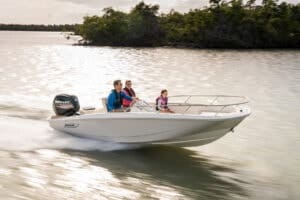The decision to buy a boat can be one of the most exciting financial moves you make, whether you’re buying a weekend fishing boat or purchasing your dream yacht. Unless you have the cash on-hand to buy your new boat outright, though, you’ll need to finance it with the help of a boat loan. If you’re ready to set sail, learn how we do boat loans at Trident Funding.
Buying a Boat: What it Means to Finance Your Purchase
Similar to a home mortgage loan or auto loan, a boat loan is an installment loan that is used to fund the purchase of a new or used marine boat. With a boat loan, your lender will buy your boat from the seller for you, allowing you to use and enjoy the boat while you repay that loan over a period of time.
Boat loans are available to qualified buyers who meet certain financial requirements. Also, depending on the lender you choose, there may be limitations as to how old or how expensive your boat can be while still qualifying for financing.
What Do I Need to Finance a Boat?
The exact requirements for boat financing can vary from one lender to the next, and may even differ depending on the boat you choose. In general, though, here’s a look at what you’ll likely need in order to get approved for a new boat loan and complete your purchase.
You’ll need a down payment
While your lender will provide the bulk of the funds required for your new boat purchase, you’ll still be expected to have some skin in the game. This comes in the form of a down payment, or a portion of your boat’s purchase that you’re expected to put up in cash.
The down payment requirement for your new boat loan can vary based on your boat’s age, size, type, and even purchase price, as well as your own credit history. In general, though, you can expect to put down somewhere between 10 and 20 percent of your boat’s total price. Your lender will cover the rest with your loan.
Not sure how much you can afford? Use a boat loan calculator to check what your monthly payment might be or get an idea of the total loan amount you could afford.
You’ll need to be creditworthy (or have a cosigner who is)
Before a lender is willing to approve you for a new boat loan, they want to ensure that you are creditworthy or that you have a history of managing your financial accounts responsibly. This creditworthiness — which hinges largely on your credit score — can indicate that you are likely to repay your new boat loan on-time and as agreed.
The minimum credit score requirement can depend on the lender and certain details of the loan. Here at Trident, we require that your credit score be at least 600 or higher to be approved for boat financing.
If your own credit score doesn’t meet this requirement, or you want to qualify for even better loan terms, you can also opt to add a creditworthy co-borrower to the loan. Your co-borrower, also known as a cosigner, is someone who agrees to share financial responsibility for the boat loan until it’s satisfied.
In general, the best boat loan interest rates and terms are typically reserved for more creditworthy applicants. So having a healthy credit score can cost you less in the end.
You’ll need to meet income requirements
A boat is a significant financial decision, and it stands to reason that your lender will want to be sure that you can afford the commitment.
Based on the specifics of your boat purchase, your credit score, and other factors, your lender may also want you to meet certain income requirements. Ensuring that you make enough money can show that your new loan payment won’t create an undue hardship.
You’ll need to meet debt-to-income requirements
Your debt-to-income ratio, or DTI, is a measure of how much you make compared to your existing debt obligations to other lenders. The higher your DTI, the more risk you represent to a lender and the less likely you are to get approved for your new loan.
If you bring home $15,000 per month but have other loans with minimum payments totaling $8,000 per month, you have a DTI of just over 53 percent. [$8,000 / $15,000 = 0.5333] Most boat lenders will expect you to have a DTI of 30 to 35 percent or lower, though the exact number can vary.
You’ll need to show proof of employment
Depending on your net worth and other assets, you may be asked to present proof of employment when applying for a boat loan. This lets the lender know that you are gainfully employed and have a source of regular income to pay for your new boat.
This proof can often be in the form of an employment offer letter, recent pay stubs, W-2 or 1099 tax forms, or even previous years’ tax returns.
What to Expect When Financing a Boat
So, you’ve picked out your new (or new-to-you) boat and are ready to buy. Here’s what you can expect from the boat loan process, from application to funding.
Types of boat loans
When it comes to marine financing options, there are two primary types of boat loans to choose from: secured and unsecured.
Secured loans are those that use an asset (usually your new boat) as collateral for the loan. This means that if you fail to pay your loan as promised, the lender can repossess your watercraft to satisfy the debt.
An unsecured loan is one that does not hold any tangible asset as collateral. These loans typically have a higher interest rate and may require a larger down payment. If you default on one of these loans, they can’t immediately come and take your boat; however, you will face damage to your credit score and may also have a judgment filed against you for the debt.
Lender options
There are a few different places to look if you’re trying to find funding for a boat purchase. These include:
- Your boat dealer — The same dealer that sells you your boat may also offer their own in-house financing option. It’s often wise to shop around to make sure that their loan terms are the best possible.
- A marine lender — Whether you’re buying a boat from a private owner, your dealer doesn’t offer funding, or you simply want to find better loan terms, a marine lender (like Trident) may be the answer. Boat lenders make it easy to apply for a boat loan no matter where you plan to buy your watercraft.
- Your regular bank — Some banks and credit unions may offer financing for boats and other marine craft, including the bank you already use for your checking, savings, and other accounts. Since you already have a relationship with them as an existing customer, you may be eligible for certain loan options and terms.
- A home equity loan — If you have equity in your home that’s just sitting unused, pulling that out with a home equity loan or home equity line of credit (HELOC) can be one way to access the cash you need for a boat purchase — or at least the down payment.
Application decision
After you apply for a boat loan, your lender will want to review your application before giving you a final decision. This means looking at how much you want to borrow, considering your current income and debt status, and reviewing your credit history.
In most cases, you should have a decision within 24 to 48 hours, if not less. From the time you’re approved, your loan offer (and its terms) will typically be good for at least 30 to 60 days; this means that you have a month or two to finalize your boat purchase.
Some lenders will even extend this loan approval up to 180 days, giving you as much as six months to find and buy a boat. However, your interest rate may be subject to change after a month or two if you still haven’t completed your purchase.
Repayment terms
Once you’ve applied and been approved for your boat loan, you’ll be offered a few different repayment terms to choose from. These will depend on your lender, the collateral on the loan, and your individual creditworthiness.
The loan’s terms will specify how long you have to repay the debt, how much interest you’ll be charged, and what your monthly payments will be.
Opting for a longer loan term may reduce your monthly payment requirement, but will often come with a higher interest rate than a shorter loan period. You’ll typically be limited to a loan term of no more than 20 years; however, you may be eligible for a term of up to 25 years as long as you’re willing to make a bigger down payment.
What If I Don’t Have Excellent Credit?
The better your credit, the better your chances of being approved for a new boat loan with the best possible terms. This means that if you have a score that’s either Exceptional (defined by FICO’s current models as anything between 800 and 850) or Very Good (a score of 740 to 799), you’ll usually have access to the lowest interest rates and down payment requirements available.
Learn how to raise your credit score if your credit is less-than-perfect. If you have Good credit (670 to 739), you may still be approved for a good loan, especially if you meet all other income and employment requirements. However, you may not get the best rates or may be required to put down a larger amount on the purchase. And if your credit is Fair (580 to 669) or Poor (300 to 579), you may not be approved at all, or could be required to add a creditworthy cosigner to the loan in order to get approved.
The Bottom Line on Your New Boat Loan
For many of us, buying a boat is one of the most exciting purchases we can make. They often come with a hefty price tag, though, leading most buyers to turn to marine loans in order to finance their purchase.
Shopping around for the right boat loan can not only enable you to buy the watercraft of your dreams, but will also help ensure that your new loan is as affordable and manageable as possible.
We are available whenever you’re ready to apply for a boat loan, offering competitive rates and terms for loans ranging from $25,000 to $2,000,000. Our knowledgeable loan officers can help answer any questions you may have along the way, and make it easy to get pre-approved whether you’re looking to buy today or in a few months.






